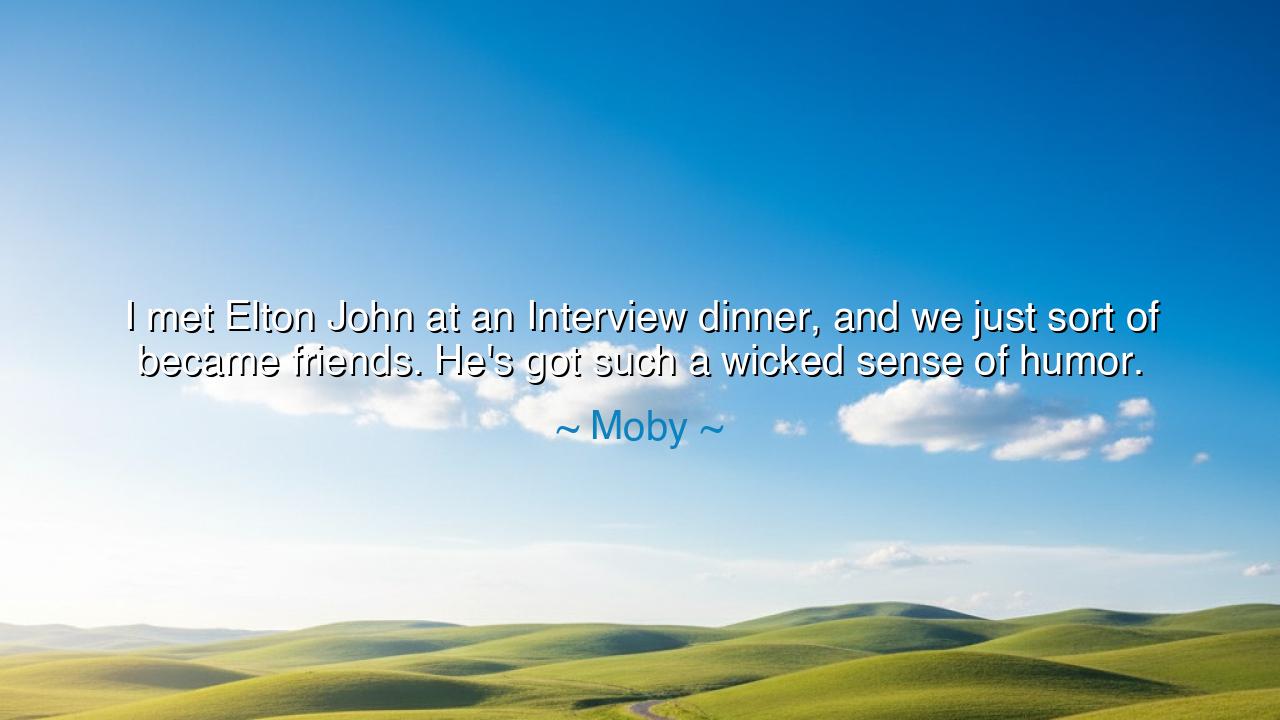
I met Elton John at an Interview dinner, and we just sort of
I met Elton John at an Interview dinner, and we just sort of became friends. He's got such a wicked sense of humor.






“I met Elton John at an Interview dinner, and we just sort of became friends. He’s got such a wicked sense of humor.” — thus spoke Moby, musician and seeker of truth, whose words, though spoken casually, carry the quiet light of revelation. In this simple recollection lies the timeless mystery of connection, the way two souls meet in the vast theatre of life and, by the spark of laughter, find kinship. It is not a tale of fame meeting fame, but of spirit recognizing spirit — a reminder that humor is among the most sacred bridges between hearts.
To say someone has a wicked sense of humor is to describe more than wit. It is to speak of a mind that sees beneath the veil of seriousness, one that transforms darkness into play, sorrow into laughter. Elton John, with his flamboyant grace and fierce brilliance, is such a soul — one who knows that to survive the tempests of fame, heartbreak, and expectation, one must wield humor like a sword. Moby, who is himself contemplative and introspective, recognizes in Elton’s humor not just mischief, but wisdom — the kind that softens pain and sharpens understanding.
The ancients, too, understood the divine nature of laughter. The philosopher Democritus, called “the laughing philosopher,” taught that joy and humor were signs of enlightenment, for only the wise could laugh in the face of life’s absurdity. “Men’s miseries,” he said, “are not to be mourned, but to be understood.” Such laughter does not mock; it liberates. It reveals the folly of taking the world too seriously — a lesson that even kings and poets must learn if they wish to remain whole. Thus, Moby’s admiration for Elton John’s humor is not about amusement alone, but about reverence for a spirit that stays buoyant amid life’s weight.
Consider Elton John’s own story — a man who rose from the shadows of doubt and addiction to become a legend of light and melody. His journey, like the music he creates, has been filled with triumph and pain. Yet through it all, he has laughed — at himself, at his fame, at the world’s contradictions. That laughter is his armor, his healing, his rebellion against despair. It is what Moby, whose own path is marked by introspection and spiritual searching, envies: the ability to find freedom through humor, to turn chaos into song and irony into grace.
In the origin of this encounter — an Interview dinner, a moment among artists — there is a deeper symbol. The dinner table, since ancient times, has been the place where souls meet beyond titles and masks. In the shared act of conversation, the boundaries of status dissolve, and only truth remains. When Moby says they “just sort of became friends,” it is the effortless recognition that humor brings. Friendship born of laughter is pure; it needs no performance. It is the meeting of two travelers who, though shaped by different paths, recognize the same melody within the heart.
Humor, then, is not mere entertainment — it is a philosophy of resilience. It allows us to face darkness without surrender, to acknowledge imperfection without shame. Those who cannot laugh at life are easily crushed by it; those who can, rise again and again. As Moby reflects, he “wishes he were that type of person,” for he understands that humor is not a denial of pain, but a transformation of it. To laugh is to look at the abyss and wink — to remind oneself that the human spirit was made to rise, not to crumble.
Let this be the lesson, O listener of time: seek humor not as distraction, but as medicine. Laugh at yourself, at your failings, at the absurdity of fate. Surround yourself with those whose laughter carries kindness, not cruelty; for such laughter cleanses the heart. When you face trials, remember that even the gods, in their myths, laughed — for laughter is older than sorrow and stronger than fear.
So, as Moby found in Elton John, may you also find friends who help you remember the sacred power of joy. For life, in its vastness, demands seriousness only from those who have forgotten how to smile. A wicked sense of humor, wielded with warmth, is not wickedness at all — it is wisdom disguised as laughter, a song of the soul that says, “Still, I am alive.”






AAdministratorAdministrator
Welcome, honored guests. Please leave a comment, we will respond soon